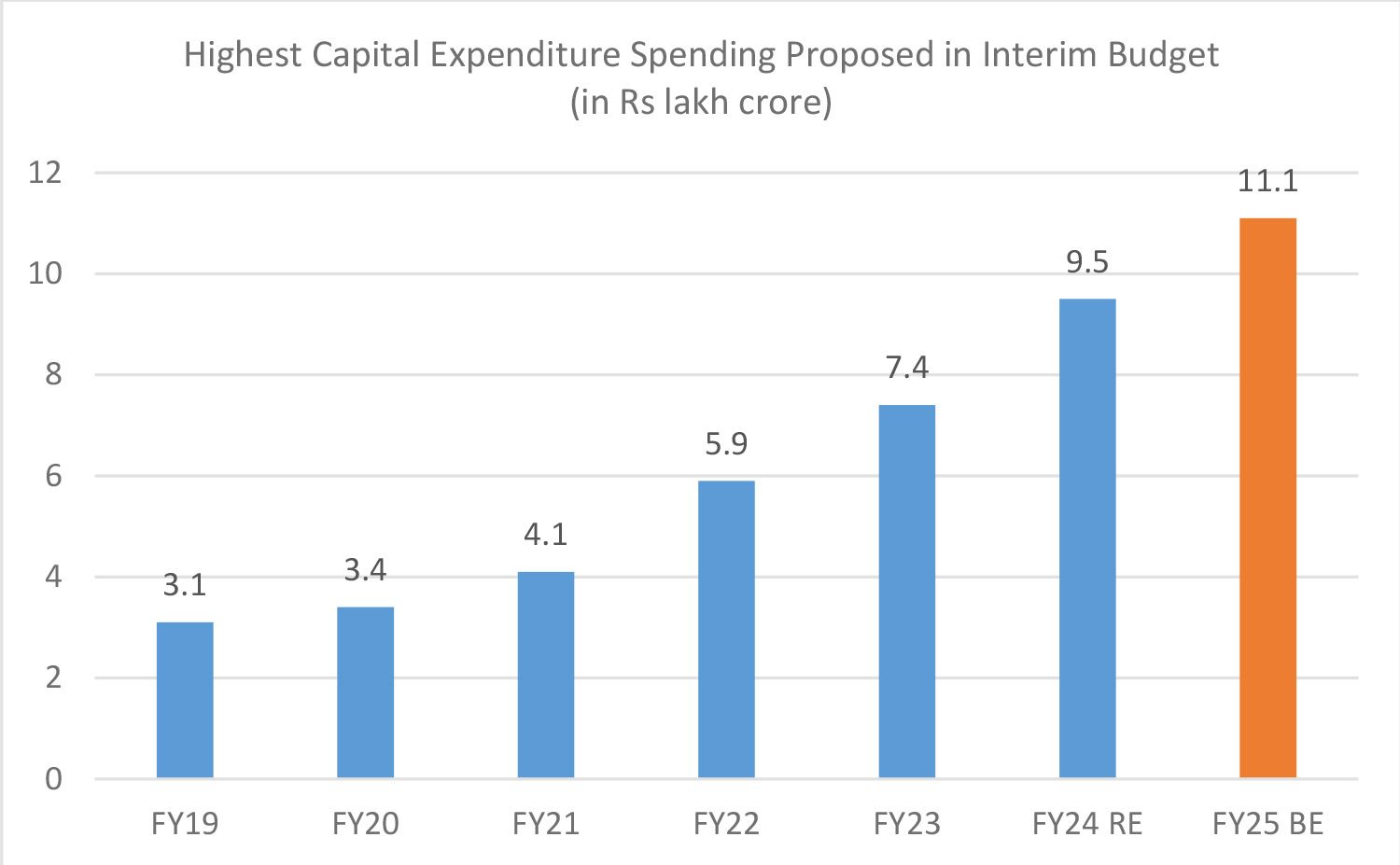Special Serves of the Interim Budget FY2024-25
The Interim Budget FY2024-25, presented on the 1st February, 2024 by Finance Minister Nirmala Sitharaman, has been a focal point of discussion and analysis across various sectors.
In her press conference, Sitharaman elaborated on several crucial aspects and laid the groundwork for inclusive development across key pillars, such as the Poor, Women, Youth, and Farmers.
While no major announcements were made, a detailed budget is expected in July after the General Election is concluded.
However, the Interim Budget was fiscally prudent and it has set a promising trajectory for sustainable economic growth until that time.
Let us look at some special Interim Budget announcements in detail.
India's Economic Trajectory
A highlight of the Budget presser was acknowledging India's consistent economic growth.
With three consecutive years of 7% Gross Domestic Product (GDP) growth, India stands as the fastest-growing economy in the G20.
This growth trajectory is a testament to the government's effective economic policies and resilience amid global challenges.
The Finance Minister's articulation of GDP as Government, Development, and Performance reflects a comprehensive economic management view.
The focus has been on sustained development and efficient economic handling, gradually reducing the fiscal deficit, even during challenging times.
Moreover, the Finance Minister's message to credit rating agencies about aligning and bettering the fiscal consolidation path underlines the government's commitment to fiscal responsibility and economic stability.
Also, note that the Interim Budget focuses on Fiscal Consolidation and Capex – both critical in achieving higher medium-term GDP growth. So, one can say there will be momentum in the GDP in the coming time.
Let us look at the Capex and Fiscal Consolidation efforts in detail:
Focused Capital Expenditure
The commitment to continue capital expenditure is pivotal, especially in maintaining economic momentum.
The government's sustained infrastructure investment is a key driver for future growth and stability.
In the Interim Budget FY2024-25, the government proposed the highest capital expenditure spending at Rs 11.11 lakh crore.
As per the revised estimates, this was notably higher than the Rs 9.5 lakh crore expenditure proposed in FY2023-24.
Here’s a look:

Fiscal Consolidation
The fiscal consolidation in the 2024 Union Budget reflects a strategic approach, balancing robust tax collections with measured expenditure.
Despite the nominal GDP growth rate being lower than expected at 8.9%, the fiscal deficit for 2023-24 was managed better than anticipated, coming in at 5.8% against a target of 5.9%. Strong tax revenues and controlled capital expenditure supported this achievement.
Looking ahead to 2024-25, the Interim Budget ambitiously projects a further reduction in the fiscal deficit to 5.1%. This projection surpasses expectations of a target of around 5.5%.
Notably, the budget steers clear of populist measures, focusing instead on sustained fiscal discipline. Two key factors underpin this approach:
1. Robust Tax Revenues: The budget assumes continued strong growth in tax revenues, underlining the government's confidence in the economy's resilience and the effectiveness of its tax policies.
2. Controlled Capital Spending: While focusing on infrastructural development, there is an expected slowdown in capital expenditure. This measured approach aims to balance growth needs with fiscal constraints.
International Connectivity
The India, Middle East, and Europe trade corridor (IMEC), highlighted in the Interim Budget by Finance Minister Nirmala Sitharaman, represents a significant leap in international connectivity and trade for India.
Signed at the G20 Summit in New Delhi, IMEC is not just a trade route; it's a comprehensive network that integrates various modes of transportation and infrastructure, promising to revolutionise trade dynamics.
This corridor, which is a part of the Partnership for Global Infrastructure and Investment (PGII), is envisioned to include an extensive network of railroads, ship-to-rail links, and road transport routes. The East Corridor aims to connect India directly to the Arabian Gulf, while the Northern Corridor will extend this linkage from the Gulf to Europe.
Sitharaman's assertion that IMEC could shape world trade for centuries highlights its strategic and economic importance, marking a historic initiative that commenced on Indian soil.
Manufacturing Units Taxation
The 2024 Interim Union Budget has introduced a notable point for the manufacturing sector.
The current special tax rate of 15%, applicable to new manufacturing units under Section 115BAB of the Income Tax Act, is set to expire for units commencing production after March 31, 2024.
This rate benefited companies incorporated post-2019, offering a significant tax advantage. The lack of an extension in the budget documents suggests a potential increase in tax burdens for these companies.
The manufacturing sector, particularly companies that faced production delays due to the COVID-19 pandemic, had anticipated an extension of this beneficial tax rate. With the budget silent on extending the 15% rate, these companies might have to contend with a higher tax rate of 22%, which applies to normal companies and adds to their financial strain.
Disinvestment Targets
The Union Budget 2024-25 marks a shift in the government's approach to disinvestment, moving away from setting explicit revenue targets to a more calibrated strategy. This strategic change aims to maximise returns from the sale of stakes in public sector undertakings (PSUs) without being bound by a specific financial goal.
For the financial year 2024-25, the government has not established a distinct disinvestment target. Instead, it has included disinvestment proceeds under the broader category of miscellaneous capital receipts, which also encompasses asset monetisation and other related revenues.
The target for these receipts is set at Rs 30,000 crore for the revised estimate of FY24 and Rs 50,000 crore for FY25.
The revised approach comes against the backdrop of the government’s past experiences with disinvestment targets. In recent years, including the current financial year 2023-24, there has been a noticeable gap between the set targets and actual disinvestment receipts. This recalibration suggests a more pragmatic and flexible stance towards disinvestment.
Additional Highlights
-
Promoting Investments: The remarkable increase in foreign direct investments (FDI) inflow during 2014-23 showcases India's emerging status as a global investment hub. The continued negotiation of bilateral investment treaties reflects a strategic approach to fostering sustained foreign investment.
-
State Reforms for 'Viksit Bharat': The allocation of Rs 75,000 crore as a fifty-year interest-free loan to states for milestone-linked reforms exemplifies the government's support for comprehensive development across regions.
So, those were some of the special and detailed takes from the recently announced Interim Budget 2024.
The Budget FY2024-25 paints a picture of a government striving for balanced growth, technological integration, and fiscal prudence.
The various initiatives and policies outlined in the presser reflect a clear vision towards building a resilient and inclusive economy, adapting to global and domestic challenges with strategic foresight.
It will be interesting to see how these initiatives pan out in the coming year.
To get more insights on the Interim Budget 2024, click here: #BeyondTheBudget
Stay tuned to this space for all the latest developments and expert insights.
Happy learning!
Sources: Kotak Securities, Indian Budget, Livemint, Moneycontrol
Disclaimer: This article is for informational purposes only and does not constitute financial advice. Investors should conduct their own research and consult with financial professionals before making any investment decisions. Read the full disclaimer here.






